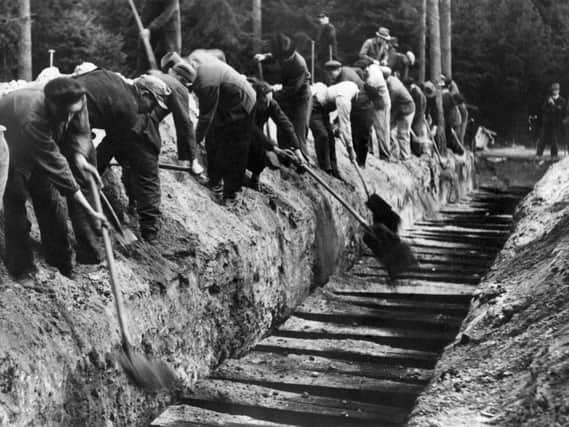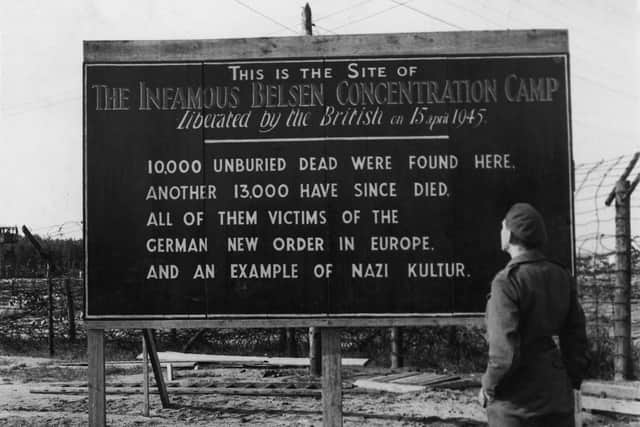Horrific memories of a Lancashire soldier who helped liberate Belsen-Bergen concentration camp


Seventy-five years ago the world was shocked to discover at first hand the latest cruel chapter of horrors and the terrible suffering which people of occupied countries across Europe had been subjected to under Nazi rule.
Former soldier Ken Allen, who was among those who went in to clear up the Bergen-Belsen concentration camp, did not live to see the 50th anniversary of this terrible event in modern history.
Advertisement
Hide AdAdvertisement
Hide AdHe died from a heart attack, shortly after relating his memories of the liberation of Belsen to the Lancashire Post on the eve of he anniversary in 1995. Here we reprint the fascinating interview first published on April 14, 1995...


Bergen-Belsen concentration camp, in northern Germany, was packed with 40,000 people of all nationalities from across the Continent.
It was liberated by the British on April 15, 1945 and for the first time photographs and newsreel films showed the world the shocking capabilities of man’s cruelty and inhumanity to his fellow man.
Belsen was not a death camp on the lines Auschwitz-Birkenau, where more than 1.1m Jews died in the gas chambers, but there is no doubt it was a place of immense suffering, brutality and neglect. Ken Allen was there and saw things that remained with him to the end.
Advertisement
Hide AdAdvertisement
Hide Ad“The stench of death could be smelt miles away - even before the concentration camp came into view. The horrible smell was so thick in the air, you could almost slice it with a knife and it made us gag.’’
Those were Ken’s words as he and a convoy of trucks drove up to the German camp for the first time. Seventy-five years ago Ken was a 27-year-old sergeant gunnery instructor with the 58th Light Anti Aircraft Regiment, and one of a 112-man detachment which liberated Bergen-Belsen.
Ken, who lived in Blackberry Way, Penwortham, said that his unit had a number of ack ack guns protecting engineers who were building a bridge to cross the River Alle, in Germany.
He recalled: “We were suddenly ordered to proceed to a place called Belsen concentration camp. We had never heard of it. Apparently a truce had been arranged between the German authorities and our Corps commander because typhoid and dysentery were rife in Belsen and the authorities were worried that the inmates would escape and spread the disease.
Advertisement
Hide AdAdvertisement
Hide Ad“Before we even got in sight of the camp, we could smell the awful stench of the place, it was terrible - but that was nothing to what we saw when we arrived. It was unbelievable... a nightmare. There were piles of bodies scattered all over the desolate camp - an estimated 10,000, rotting, unburied bodies.
“There were 40,000 starving inmates, dressed in rags, who were nothing but walking skeletons and they were dying at the rate of 500 a day. In control were 400 German guards, half of these were SS troops, and about 4,000 Hungarian soldiers. What struck us was the arrogance of the SS and their complete disregard of the suffering going on around them. We immediately ordered all of the guards, including the officers, to use pick and shovels to dig huge communal graves to bury the dead.
“We put the strongest of the inmates in charge of the work parties and gave them whips, which they used with relish on the former guards. You could say there were quite a few reprisals. On the evening of April 15 the prisoners rioted over a potato dump and soldiers had to fire over their heads to restore order. We were at Belsen seven days trying to clean up the camp and restore some semblance of order.
“It was seven days of hell, like something out of your worst nightmare. Even when we left it was still chaotic. What has remained with me throughout my life was the cruelty of the German guards and their complete disregard for human life.’’
Advertisement
Hide AdAdvertisement
Hide AdBelsen had originally been built as a prisoner of war camp and in 1940 it housed 600 French and Belgian Prisoners of War.
In January 1945, with the Allied troops advancing on Germany from the West and the Russians advancing from the East, 10,000s of prisoners from other concentration camps across Nazi held territory were moved there, which led to sanitation, water and food supplies breaking down.
When British and Canadian troops entered in April they found more than 13,000 unburied bodies and 60,000 inmates, most acutely sick and starving. The prisoners had been without food or water for days before the Allied arrival and typhus was rife.
Sister Emily Harding, who lived in Preston for more than 25 years, saw at first-hand the sufferings of the death camp inmates. Two weeks after Allied troops moved in, she was posted to a camp in Belsen to care for some of the victims of the Nazis.
Advertisement
Hide AdAdvertisement
Hide AdHer harrowing experiences are recorded in letters and newspaper articles which were passed down to her niece Emily Watkinson and shared with the Post in 2001.
In one particularly harrowing interview Sister Harding talks about the camp in Belsen. She said: “It would be impossible for anyone who had not witnessed it to imagine anything so terrible. The lowest types of barbarism seemed to have been reached.
“Moving down the corridors one saw it was a place of death, it looked out of every face and was emphasised by the awful stench. Patients that we attended bore traces of brutality. There were bruises from whips, sores from different diseases which had not healed and they were covered with lice.
“An emaciated figure told of the midwifery functions which she performed in the camp. She would be up all night and then, in the morning, the Germans would take the newborn babies and shoot them.”
After serving in Belsen, Sister Harding worked as a nurse helping people all over the world, before she died at her home at Bloomfield Grange, Penwortham, in 1997.
Comment Guidelines
National World encourages reader discussion on our stories. User feedback, insights and back-and-forth exchanges add a rich layer of context to reporting. Please review our Community Guidelines before commenting.